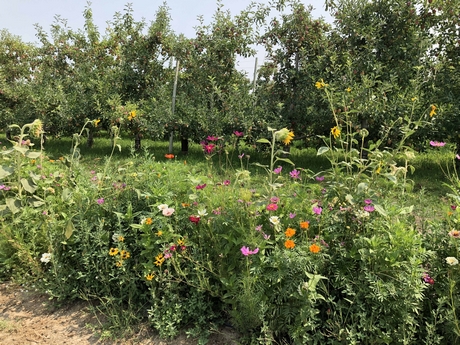Rainier Fruit is undertaking a number of projects to expand their pollinator conservation efforts on Eastern and Central Washington properties. Loss of habitat continues to threaten native bee species, and by launching these projects, Rainier Fruit will diversify the habitat and food resources available to bees and other helpful insects.
The projects are part of the larger General Mills Pollinator Initiative, which aims to increase on-farm natural habitat to support native and honey bee populations while also reducing pesticide impacts on bees through reduced applications, improved practices and biocontrol as pest management. While Rainier Fruit has already adopted many best practices when it comes to conservation and sustainability, they’re taking this opportunity to further their existing programs and establish the company as an industry leader in conservation practices.
“As fruit growers, we depend on pollinators. Enhancing the natural habitat available to native bees and honey bees is a win-win,” says Mark Zirkle, President at Rainier Fruit. “These projects will offer forage and nesting resources for bees and increase bee diversity and abundance. We may even see supplemental pollination services for our crops through the impact of these initiatives.”
In their Pollinator Conservation Initiative, General Mills has partnered with the Tree Top Growers’ coop and the Xerces Society for Invertebrate Conservation. General Mills will provide funding for native seeds, plant materials, and the time of conservation experts from the Xerces Society who serve as planners and consultants. As a member of the Tree Top Growers’ coop, Rainier Fruit is eligible to participate and will contribute the labor involved in site preparation, planting installation, and maintenance. Because the scope of the projects at Rainier Fruit has exceeded the guidelines set out through the General Mills initiative, the Xerces Society has also provided grant funding to ensure the success of all the new projects.
Consultants from the Xerces Society have helped to establish a three-year plan for improving pollinator resources on several Rainier Fruit properties. The first sites are currently under preparation, and will have wildflowers plug-planted along the edges of the orchards this fall. Wildflower beds contain a large selection of plant species that support pollinators. While installing wildflower beds through plug planting is labor intensive, the process will yield blooming plants more quickly than planting from seed.
In addition to wildflower banks at the edges of orchards, Rainier Fruit also plans to install hedgerow plantings of flowering perennial shrubs along established irrigation ditches, and create a meadow near the irrigation pond located on their Selah, Washington home property. The meadow will be a mix of native, low-growing annual and perennial wildflowers that provides excellent floral resources for bees. In other areas, the team at Rainier Fruit will be drill-seeding wildflowers into natural areas that currently grow a mixture of annual grasses in order to diversify the habitat.
“A lot of work goes into preparing these sites so we can ensure the longevity of these projects,” explains Andy Tudor, VP of Business Development at Rainier Fruit, “We are waiting until the fall of 2019 to plant some of the areas so we can make sure that each site is adequately prepared and the wildflower plantings won’t be under heavy weed pressure. We’re also planning accordingly so we can minimize or eliminate pesticide use once the pollinator habitats have been planted.”







